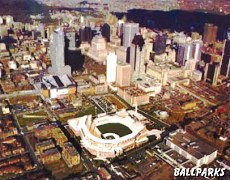
By Ted Blackman/ The Gazette
My first summer in the city in many years invited the same two questions on every second street corner: "Do you think we'll keep the Expos?"
"Do you miss the country?"
Only when you asked me the first question.
At last, however, after all the stops and starts, I think I stumbled upon a piece of reassurance that leads me to believe the Jeffrey Loria saga and its downtown-ball park stage are headed toward a happy ending.
It was a chance meeting at the surprise-birthday/going-away party for 40-year-old Andy Nulman at the Just for Laffs Museum where we heard that, as a young man, he had once dumped a date from his car on the Metropolitan Blvd.
"She started singing along with one of Andy's precious tapes and fumbled the lyrics," a onetime classmate explained to about 100 guests at the white-linen banquet tables.
Chuckling beside me, by pure accident, was the handsome Stephen Bronfman, another semi-retired entrepreneur who, it's widely promised, is about to plunge some profits from a Rolling Stones tour and the sale of TSN into the Expos.
"This isn't the time or place," I said, "but when this complex baseball takeover is finalized we've got to sit down and have a long chat, like I used to do with your dad."
"Love to talk baseball," Bronfman said. "We'll get together. And very soon."
"You mean this is all going to fly?"
"You're going to love the new ball park," Bronfman said with the same confidence and sparkle that his father, Charles, had shown 31 years ago when small-ante partners bailed out and he saved a baseball team almost still-born.
Charles was originally in for 10 per cent of the $10-million franchise fee in 1968, but J. Louis Levesque and others got cold feet, and only Lorne Webster, Hugh Hallward and the Beaudry brothers held firm. Bronfman ended up writing a stiff for $6 million or $7 million.
Had Charles waved the white flag, as he had every right to do, the franchise might have reverted to Buffalo or Dallas, and his own father, Sam, would have been happier seeing his son concentrate on the family's core business. But here was CB's opportunity to leave his own mark on a civic project, and it worked well enough, even through the free-agency landmarks of Catfish Hunter, Andy Messersmith and Reggie Jackson to produce contenders from 1979-81.
Then came the baseball shutdown of 1981, the divided season, and even though the bandaged schedule produced the Expos' only division title, sadly ended by Rick (Blue) Monday, Stephen, at 14, could see his father's waning enthusiasm.
"The All-Star Game in Cleveland, 1981," Stephen recalled at the Nulman bash. "I was there with my dad and my friends. When Gary Carter hit his first home run, we cheered. When he hit his second, we were standing on our seats going wild."
Of course, Carter was named the game's MVP.
"But when I looked down at my father, he wasn't even moving and I asked, 'Dad, aren't you excited? The Kid just hit his second homer,' " Stephen recalled. "My father looked up at me and said, 'Yes, I noticed, and each one is going to cost me a million dollars.' "
CB wasn't far off. Carter signed a five-year contract that Charles later labeled his worst mistake, not that Carter wouldn't deliver full value here and for the Mets, but because he knew he'd been entrapped in spiraling labour costs.
It took Charles 10 more years to escape baseball, and a brief parallel experience with the Alouettes. He pawned off football to Norm Kimball, who ran with his allowance, and then baseball to Claude Brochu, who runs with another unearned bundle.
But is Charles ever really out?
Financially, yes, and legally, technically and geographically, but sentimentally he's still peeking through a knothole in the outfield fence.
His son Stephen has made his own money out of a head-start family stake, of course, and can do with it what he likes. As long as it seems to be a 10-per- cent holding, his father's original intention, it appears to have won approval at the dinner table.
"I've talked to my father a good deal about this," Stephen said. "He's been very helpful."
Previous article
Next article
Head back to Save the Expos Home Page
